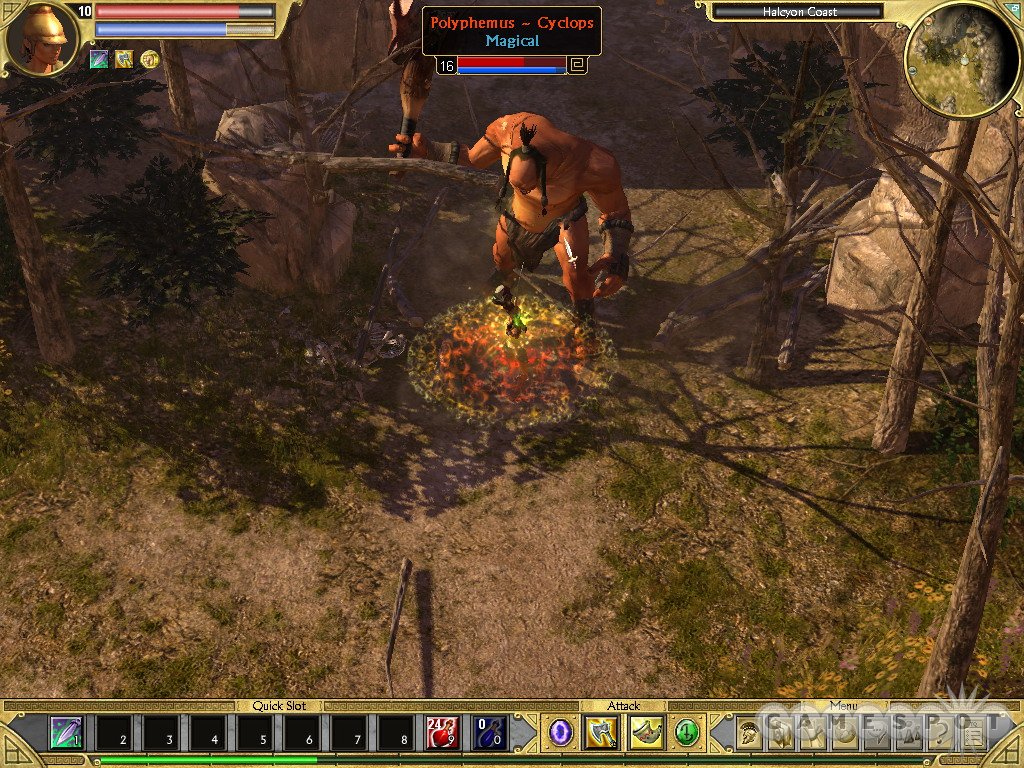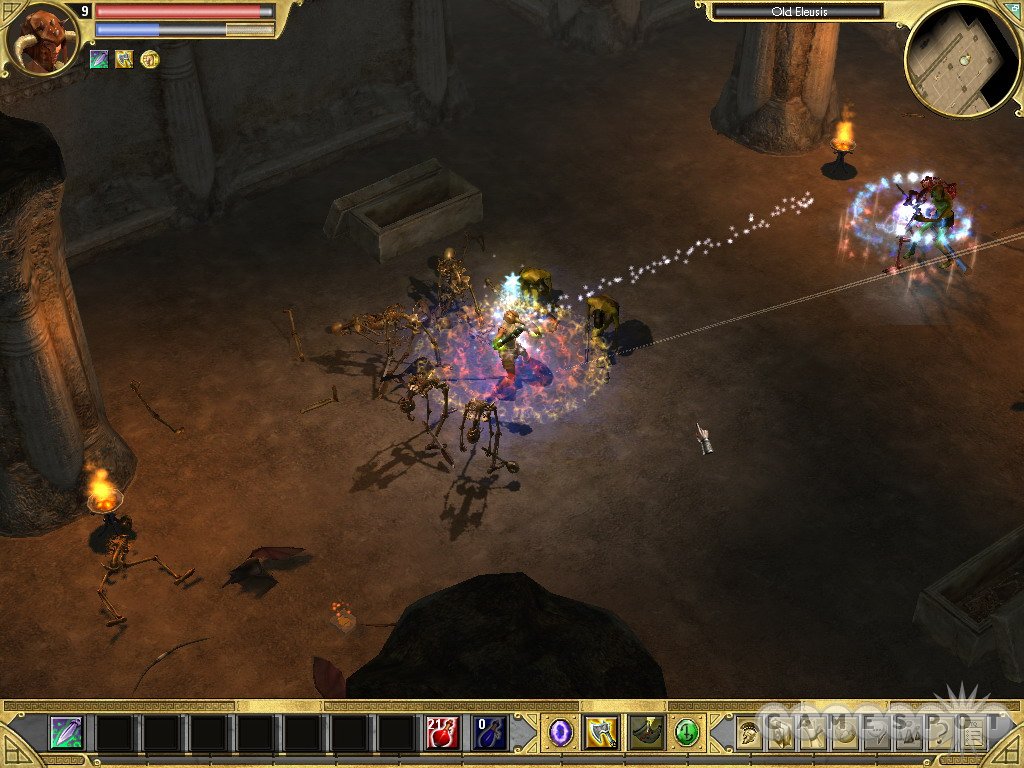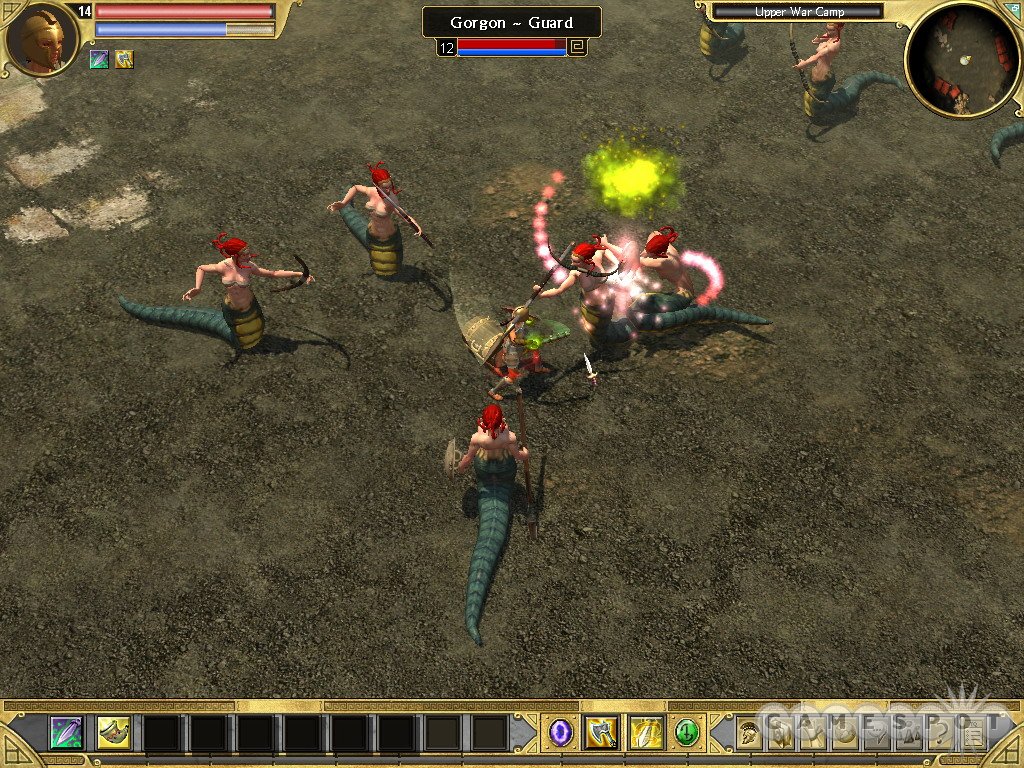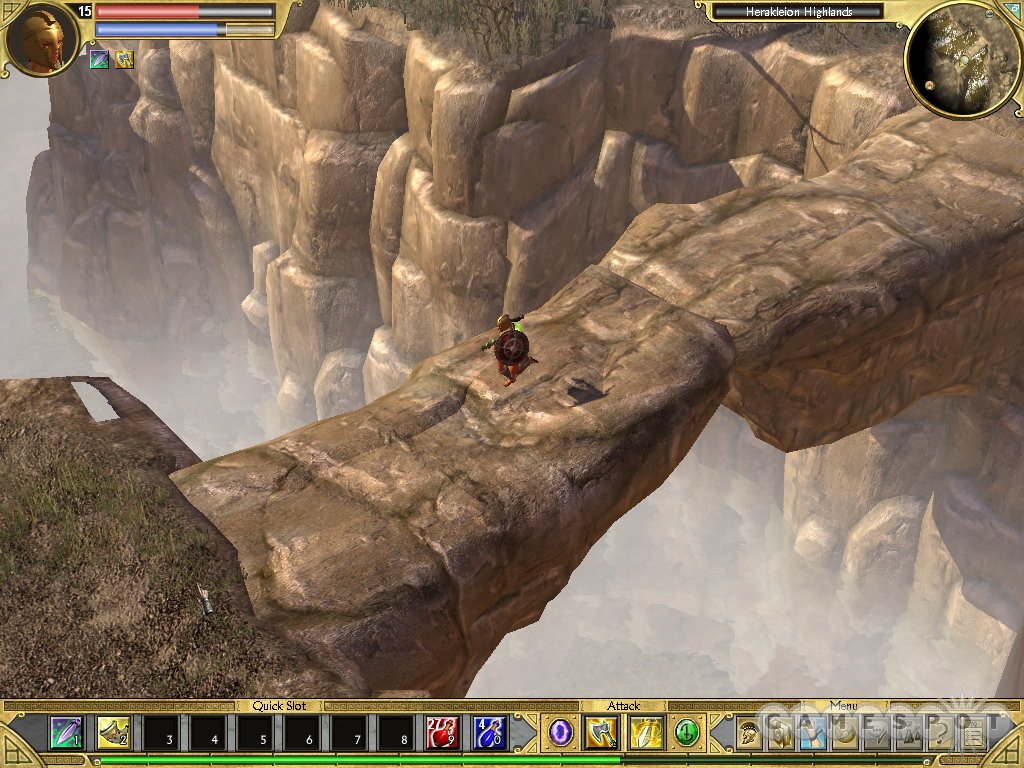It is apparent that the developers at Iron Lore, makers of Titan Quest, have played more than their fair share of the Diablo games. Though it trades a pure high-fantasy feel for a mythical take on the ancient worlds of Greece, Egypt, and Asia, Titan Quest is so similar to Blizzard's seminal hack-and-slash role-playing game series that it's essentially a warts-and-all homage. It's certainly well-made enough to please those who prefer more action and less plot in their RPGs, and there are dozens and dozens of hours of gameplay to get lost in here, but it's hard to shake the feeling that you've already seen most of what Titan Quest has to offer.

Those familiar with their Greek mythology will know that Zeus and the rest of the Olympians achieved their status within the world of gods by going to war with, defeating, and eventually imprisoning their forebears, a group of powerful elder gods known as the titans. Titan Quest opens up with these none-too-happy deities being freed from their prison, and they immediately use their great powers to wreak havoc on the mortal men that worship the Olympians. In an against-all-odds fight, you'll take on the role of a hero determined to stop these ravenous gods.
Your options when you first create your hero are quite limited--you can name your character, choose his or her gender, as well as the default color of his or her tunic, and then you're off to the titan-ravaged Greek countryside. It's a little surprising how few choices you're given when choosing your hero's appearance, though since the game is played mostly from a faraway, angled overhead perspective, skin tone and hairstyle are barely even perceptible, especially once you start burying your hero under layers of armor and weaponry. There's also no hand wringing to be done during the initial character-creation process over character class, since Titan Quest handles the path of your hero in a fairly dynamic fashion as you progress through the game.
The basic rhythms of the gameplay in Titan Quest should be quite familiar to anyone who has played Diablo, its sequel, or any of the dozens of knockoffs that have cropped up in the years since. Using a mouse-heavy interface, you'll explore open countrysides, forests, farmlands, ancient ruins, catacombs, swamps, caves, and other environments that are all just rotten with unfriendly monsters. If the idea of scouring the world for treasure and clicking your way through wave after wave of enemies doesn't appeal to you, turn back now, since that's mostly what Titan Quest has to offer. The gameplay is very single minded in this regard, and the quests you'll take on revolve around the mindless slaughter of monsters more often than not, to the point that you'll likely find yourself skipping through lots of the spoken dialogue, since it's usually just a flowery way of saying "go kill this guy."
The game features a great variety of mythically derived creatures, and it throws them at you early and often. Within the first few hours, you'll be crossing swords with satyrs, centaurs, harpies, gorgons, and cyclopes. Naturally, you can expect magic-using and bow-casting monsters to attack you from a distance, while melee-driven monsters prefer to get up close. Some monsters can spring traps, summon pets, or call for reinforcements, and occasionally a monster that you're about to finish off will make a run for it, but the combat generally doesn't require complex tactics. Mostly, all you need to do is keep an eye on your health bar and time the use of your hero's abilities so that your enemies go down before you do.

You'll make your first real decision about what sort of abilities your hero will have when you gain enough experience points from defeating monsters and completing quest segments to hit level two, which is when you'll choose your first school of mastery. Every time you advance a level, you're allotted points that you can put toward core attributes such as health and magical energy points, as well as strength, intelligence, and dexterity. There is a separate set of points for specific skills that are divided into eight different schools of mastery--warfare, defense, hunting, rogue, earth, storm, nature, and spirit. Generally speaking, the first four are best suited for fighters, while the latter four are good for bolstering a spellcaster. Within each mastery, the skills are tiered in such a way that you'll initially only have a few skills to put your points into, though you can choose to spend points on opening up new tiers of skills if the lower-level skills don't interest you.
What makes the mastery system even more interesting is that, a few levels later, you're given the choice of adding a second mastery, letting you further diversify your character's skills and making him or her that much more unique. Hardened RPG players should be intimately familiar with the regular desire to reroll a character after discovering that a particular class isn't to their liking. The mastery system in Titan Quest sidesteps that by letting you cobble together your own custom character class, and, should you find that you're not really using some of the skills that you've spent points on, you'll regularly run into non-player characters that will, for a fee, let you reallocate skill points. The generally flexible attitude toward character development is definitely one of the more clever aspects of Titan Quest, and it goes a long way toward keeping you from ever feeling like you're stuck with yesterday's bad decision.
As forward thinking as the mastery system is, though, there are parts of Titan Quest that would've benefited from some streamlining, most notably the inventory system. You'll pick up a staggering variety of weapons, armor, jewelry, potions, and magical enchantments from felled enemies, treasure chests, quest givers, and merchants, and all of it will go into your personal inventory. Displayed as a flat grid, every item you pick up takes up a number of grid spaces in your inventory, and when you're out of grid spaces, you're out of usable inventory space. Actually, you might still have usable inventory space, since the game doesn't automatically optimize item placement on your inventory grid. This forces you to regularly pause just to puzzle piece your way through your inventory to create more usable room.

To its credit, the game does color code items to help make it easier to discern what's potentially valuable and what's trash, and it can be worth the trouble to scour the battlefield for useful gear, since you'll often find that the stuff dropped by monsters is more potent than what's being offered by nearby merchants. If the gear you're using isn't up to your exacting standards as-is, you'll also regularly happen upon performance-enhancing relic shards and monster charms that you can enchant your gear with. You can only apply one type of enchantment to a piece of equipment at a time, and once it's applied, it's permanent, though you can stack several of the same type to make the enchantment more potent.
The experience offered by Titan Quest is largely linear, but it's also incredibly long, and depending on how much time you spend pursuing optional side quests, it could conceivably take you more than 40 hours to play through the game on the default difficulty, and there are two more difficulty levels to unlock beyond that. Topping it all off is a rather powerful mod tool that lets you create your own custom maps and quests. It's a really nice touch, albeit one that requires a level of technical prowess that will keep it from being of much use to most people. Regardless, it opens up the promise of aftermarket content to keep people playing Titan Quest long after they've tired of what comes in the box.
There's also a nicely integrated cooperative element to Titan Quest, which lets you take the hero from your single-player campaign online without interrupting your offline quest progression. When you're selecting your hero character from the main menu, you can select to join an existing multiplayer game, at which point you're brought to the game's built-in browser, or you can start your own, choosing the number of allowable players, the level range that a player has to fall within to join the game, and whether the game is password protected. Once you get online, you'll pick up the game right where you last left it, and other players can join and drop out at will, which means that you can easily recruit up to five other players to help you through a section that's been giving you trouble, then go back to playing solo as you please. It's solid, and there are a lot of skills within the different masteries that seem tailor-made for online, making it worthwhile to seek out a diverse party. At the same time, there are aspects to the coop that seem antiquated, specifically the inability to define specific loot rules--as it is, any item on the ground is fair game for any player.

The world of Titan Quest is massive, and one of the best things about it is the strong sense of place it gives you. The game presents itself in huge, uninterrupted segments of land, with lots of nooks and crannies to explore, hidden dungeons to find, and optional side-quests to undertake. A great level of visual detail furthers this sense, such as in the way tall grass will sway around your character as you run through open fields or in the way the shapes of shadows will slowly change as the world goes through its accelerated day-night cycle. For all its slick dynamic lighting and dazzling spell effects, though, Titan Quest can be a bit of a resource hog, demanding a top-of-the-line system to show off all of its eye candy. The visuals scale down well enough, though even when we weren't pushing the upper limits of our hardware, we still noticed pronounced choppiness when the screen was flooded with monsters, or during dusk, when there seems to be a lot of lighting effects at play. Great ambient sounds complement the different environments nicely, though the music sounds a little too stock for its own good, and the voice acting is often inconsistent and unconvincing.
Since it seems unlikely that Blizzard itself is going to produce a new Diablo game anytime soon, Titan Quest really is the next-best thing. The gradual approach to character creation taken here is welcome, and the sheer scope of the single-player campaign, coupled with the cooperative play and tools to create your own campaign, means that players willing to commit to the experience will have a wealth of content to keep themselves busy with. There's no shame in modeling your game after the genre-defining Diablo franchise, which capably streamlined the PC RPG into something faster and more accessible, but some of Titan Quest's holdovers seem a bit antiquated. It doesn't take action RPGs to a whole new level or anything, but you'll probably have fun with it if you've enjoyed these kinds of games in the past.
Editor's note 06/27/06: Our review originally overlooked specific aspects of the town portal system, which required a reevaluation of this part of the game and a revision to the text. GameSpot regrets the error.